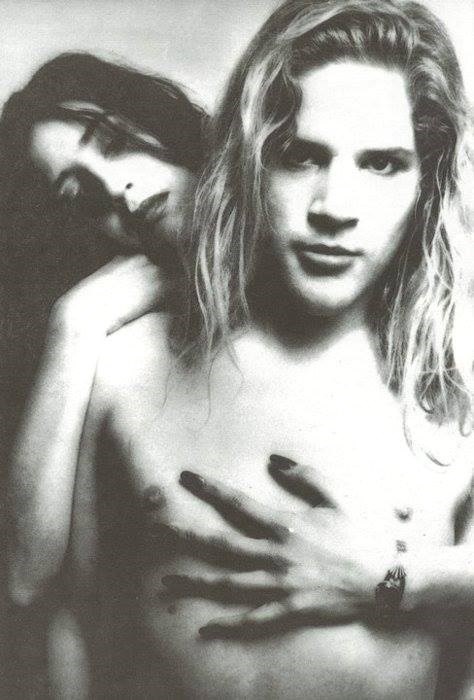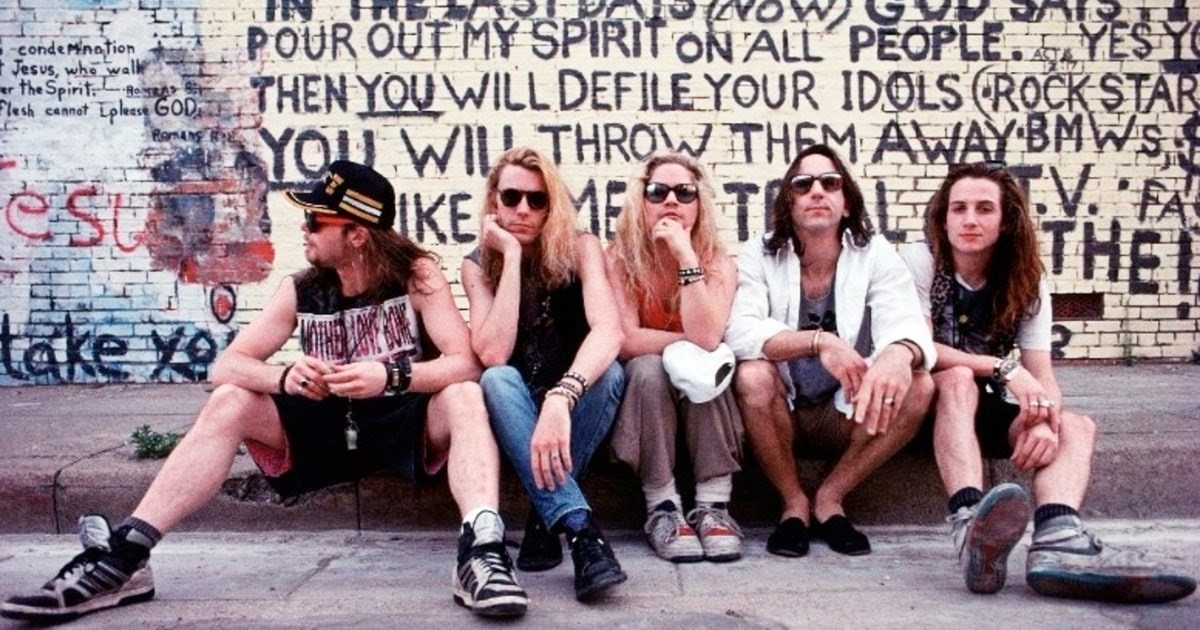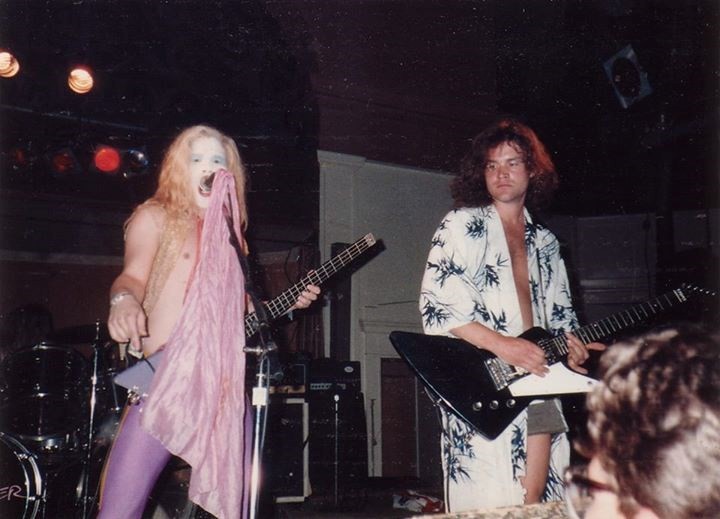Remembering Andrew Wood, Grunge’s Most Underrated Genius
- TextThomas Hobbs
On what would have been his 52nd birthday, Another Man remembers Andrew Wood, the flamboyant grunge frontman whose death opened up the doors for Pearl Jam
When you think of grunge music it’s hard not to conjure up images of Kurt and Courtney, Chris Cornell humming the chorus of Black Hole Sun and Pearl Jam’s gothic video for Jeremy. However, it was Andrew Wood who helped pave the way for these artists, with his bravely flamboyant on-stage persona and theatrical rock anthems giving his peers the faith that grunge could become far bigger than Seattle. Wood’s story is marked with tragedy, with his band Mother Love Bone’s hopes for major label success derailed by their lead singer's shock death at 24. The remaining members would go onto form a band called Pearl Jam, arguably the biggest rock band of the 1990s, while Wood’s name would become synonymous with the phrase ‘what if’.
***
When Andrew Wood performed at a club in Seattle in the 1980s, it was something you didn’t forget in a hurry. With his face clad in clown make up and lipstick, Wood, wearing one of his mother’s pink dresses, would whip his thick blonde locks back and forth as he sung pitch-perfect glam grunge melodies. Taking on the persona of ‘Landrew The Love Child’, Wood, along with his band Malfunkshun, lit up the Seattle scene with distorted guitars and theatrical rock anthems, making small basement clubs feel like vast stadiums. For locals, it wasn’t a question of if, but only when, Wood would achieve national stardom.
“They were one of the wildest bands I ever saw and had something really mysterious going on, I’d say it was almost voodoo,” recalls Seattle-based producer Chris Hanzsek, who gave Malfunkshun their big break on the Deep Six album, a 1986 compilation of the area’s best bands including Melvins, Green River and Soundgarden.
“Andrew struck me as somebody looking for something rare; he was a real treasure seeker. When we were recording [Deep Six] and setting up for vocals, I noticed he had brought along three pairs of outlandish sunglasses and a few costumes as well. I said to him: ‘We’re only recording vocals, there isn’t an audience here,’ and he shrugged his shoulders and said to me: ‘I need to get into character!’ It was like watching a method actor.”
Wood had a booming voice built for arena tours, with his diction every bit as dramatic as a Ziggy Stardust-era David Bowie. As a child, Wood saw KISS perform live, which inspired him to experiment with make-up and take on a theatrical persona. Subsequently, Malfunkshun songs such as Jezebel Woman inherited a playful self-awareness.
“[Malfunkshun] were one of the wildest bands I ever saw and had something really mysterious going on, I’d say it was almost voodoo” – Chris Hanzsek
“I remember when Andy was unsigned he recorded this cassette called Melodies and Dreams, and had his face in full-make up on the front cover. He put out like 20 copies in all the record shops in Seattle and they all sold in seconds; when does that ever happen?” Xana La Fuente, Wood’s fiancé, tells me.
For La Fuente and Wood it was love at first sight. “I used to work in this vintage clothing store, which sold really fine stuff from the 1920s, and Regan [Hagar], who was the drummer in Malfunkshun, walked in one day while Andy was looking for a guitar next door. He went and told Andy: ‘Your future wife is in the next room!’”
She adds: “Andy wasn’t a rock star back then, he was just this really funny guy. He had been in rehab and was living with his dad. He would come in every day at 2pm and we would talk. We started meeting in the evenings and would hold hands in the park. It was so sweet and innocent.”
Before long, the couple would move in together, with Wood persuading his housemate Chris Cornell, who fronted an emerging grunge band called Soundgarden, to take in a third person. The reality is La Fuente and Cornell, who himself worked at local vintage clothing store called Retro Viva, would pay the lion’s share of the rent as Wood spent his days writing and recording music in the apartment’s boiler room. Cornell, who committed suicide last year at the age of 52, would later recall: “Andy was so freeform, he didn’t really edit his lyrics. He was so prolific and in the time it took me to write two songs, he would have written ten and they were all hits.”

Producer Hanzsek says Wood created such a buzz locally because of his fearless approach to experimenting with masculinity. “He wasn’t scared what anyone thought about him wearing dresses. Andy had a certain courage and confidence that he could be exactly who he was. He could fearlessly defend whatever he believed in. He didn’t seem corruptible.”
La Fuente counters: “He was pretty naïve sexually to be honest, but also open-minded to experimentation. We used to have sex every night to Kate Bush’s Hounds of Love, so I can definitely tell you he wasn’t gay or bi, but he just loved the theatre of cross dressing. It was because he worshipped people like Garry Newman, Elton John and Freddie Mercury.”
However, even though La Fuente insists Malfunkshun were the truest reflection of Wood’s artistry, the band’s glam rock aesthetic and reliance on brother Kevin Wood’s improvisational psychedelic guitar solos weren’t commercially viable. In fact, Sub Pop passed up on signing the band as they “weren’t grunge enough”.
Subsequently, in 88’, Hagar and Wood began playing with Stone Gossard and Jeff Ament of Green River, a local band that although also seen as one of the architects of the Seattle grunge movement, weren’t yet marketable enough for a major label. Former Green River guitarist Bruce Fairweather and Skin Yard drummer Greg Gilmore, replacing Hagar, would complete the line up, with the group focusing all their energy on becoming America’s biggest rock band. Step forward Mother Love Bone.
“... he just loved the theatre of cross dressing. It was because he worshipped people like Garry Newman, Elton John and Freddie Mercury” – Xana La Fuente
With this new band, Wood flourished, with the more technically gifted musicians of Ament and Gossard elevating his songwriting to another level. On songs such as Crown of Thorns, Wood’s lyrics (“have you ever heard the story… of Mr. faded glory?”) create a strangely thrilling atmosphere of melancholy. The voodoo vibes Hanzsek spoke of are also present on eerie introspective cuts such as Bone China. When Wood delicately coos: “I’m just waiting on that dream” you feel his hunger for fame in the pit of your stomach.
But even if Mother Love Bone developed a more serious sound then Malfunkshun, the band still maintained Wood’s prominent sense of fun, with upbeat songs such as Stargazer and Holy Roller sounding like Led Zeppelin turbo charged by Aerosmith. A bidding war quickly started for the band’s signature, with Mother Love Bone taking lunches with eight to nine major labels. And by late ‘89, the band were in California recording their debut album Apple for Universal-owned Mercury Records. However, even if things looked rosy from the outside, the reality was very different.
“His family wouldn’t listen to me, all they wanted to talk about was the record deal. I tried to tell them Andy was relapsing but nobody wanted to fucking confront him. I was just a baby myself, I was 21, so I couldn’t do it alone,” La Fuente claims.
“I remember one night he was stood outside our apartment crying because I had busted him using heroin. He was sobbing and said to me ‘this is what I am!’ He just couldn’t find a way to stop.” In an interview promoting the upcoming release of Apple, Wood boasted: “If Mother Love Bone is not going to be the band of the 90s, I’ll form another band that will be.” But tragically, he wouldn’t live long enough to see the record come out.

“I walked in and he was lying flat on his back and I just knew it was weird,” says La Fuente of that fateful night of March 16, 1990. “By the time the ambulance got there, they were making me sign forms to say Andy was clinically dead.” Interestingly, La Fuente suspects “foul play”. She adds: “At the time, Andy had been clean for months, he had just got out of rehab. None of it made any sense.”
Wood’s brain would swell and he was kept alive in hospital for three days in a vegetative state so his friends and family could say their goodbyes. And by March 19, 1990, Wood, who was just 24, would be officially pronounced dead from a heroin overdose.
Wood thought it was his destiny to form the defining band of the 90s, but ironically it was his fellow band members who would realise this dream, forming a little band called Pearl Jam shortly after his death. Producer Hanzsek worked with a “distraught” Ament and Gossard after Wood’s passing, on the very first Pearl Jam demos: “I remember talking to Stone [Gossard] and him telling me ‘If nothing comes of this project, I will hang it up and get a regular job.’ It was a really depressing thing to hear as these guys were so talented. Well, they made this tape with 14 songs minus the vocals. A kid called Eddie Vedder auditioned and sent back vocals for all the tracks, and the rest is history.”
This demo culminated in Pearl Jam’s classic debut album Ten, a landmark moment for grunge that would go on to sell 10 million copies. And a year before Ten was released, Cornell, who was well on the way to global stardom with Soundgarden, formed The Temple of the Dog band, which included the likes of Ament, Gossard and Vedder, as a tribute to Wood. To mark the 25th anniversary of the sole Temple of the Dog record, the group toured back in 2016, but La Fuente made headlines when she criticised the shows. It’s a position she maintains: “None of them have properly taken care of Andy’s people, they waited until his mum was almost homeless before buying her a new trailer!”
“Kurt had all this physical pain and it was all about his ‘struggle’, some real hippie shit, but with Andy it was all about making you smile. That’s the Andy I like to remember – he was a free spirit” – Xana La Fuente
For Wood’s fiancé, who would go onto be affiliated with Alice in Chains, it wasn’t easy watching Pearl Jam succeed without Wood running the show. “I remember hearing Ten and feeling cheated because I know Andy had written at least 25% of the melodies and the songs [with Stone] on there. It was a weird feeling watching them become the biggest band in the world,” she admits.
“Vedder has a cameo in Walk Hard, he is in Twin Peaks, he’s literally everywhere, it never fucking ends. How do you think that makes me feel? I’m not saying Eddie Vedder has never written a good song but he’d still be pumping gas in Santa Cruz if Andy never died.”
In many ways, this remains the great unanswered question – how would grunge have changed if Andrew Wood had of lived? Would Eddie Vedder have emerged? Would Nirvana still have blown up? Could Mother Love Bone have sold millions of records? For Hanzsek, the genre became far too serious after Wood’s death: “In the 80s all the Seattle grunge bands were 100% about having fun and 0% about making money, but that flipped completely. I guess [after Andy died] Sub Pop repackaged grunge as this screaming boy rock thing.”
But rather than speculating on what could have been, La Fuente would most like her ‘soul-mate’ to be remembered for his sense of fun. She believes Wood’s sound lives on through new Seattle bands such as Ten Miles Wide. “Half the time, Malfunkshun struggled to play as they couldn’t stop laughing. Andy would do this Joe Cocker imitation live on stage and everyone in the crowd would be pissing their pants,” she concludes.
“Kurt had all this physical pain and it was all about his ‘struggle’, some real hippie shit, but with Andy it was all about making you smile. That’s the Andy I like to remember – he was a free spirit.”












